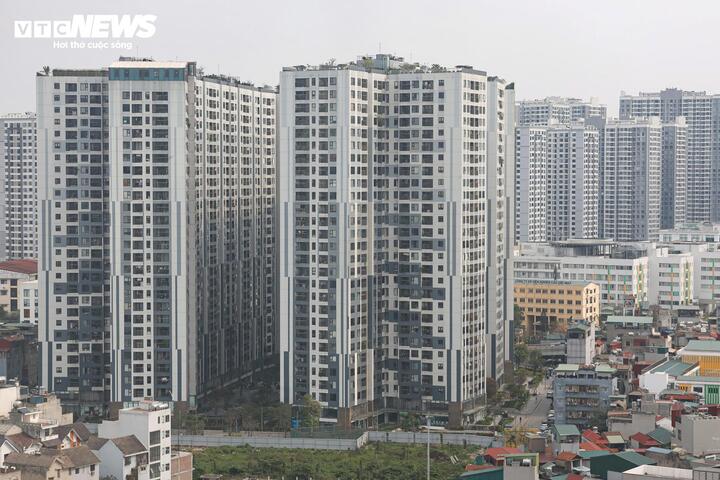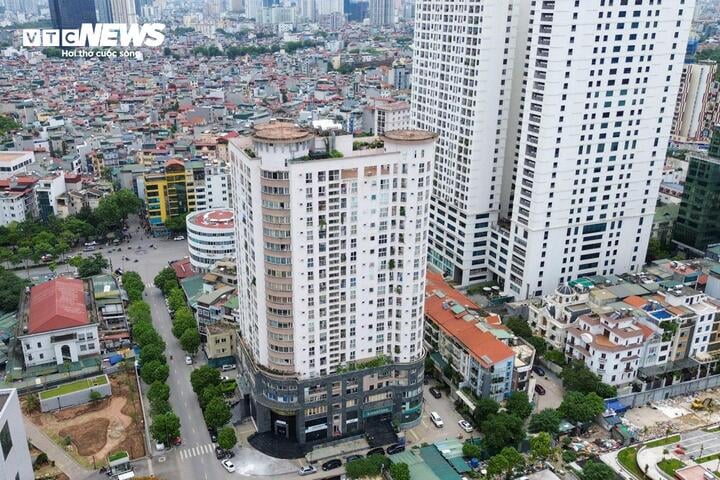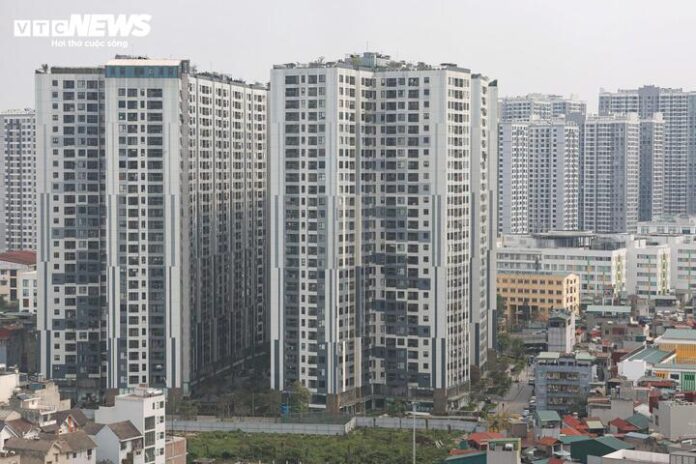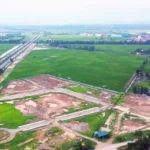The Ministry of Finance is seeking feedback on the draft Decree amending and supplementing a number of articles of Decree No. 103/2024/ND-CP dated July 30, 2024, of the Government regulating land use fees, land rent, and Decree No. 104/2024/ND-CP dated July 31, 2024, of the Government regulating land development funds.
The proposed retroactive handling and hefty tax surcharge have sparked controversy. Specifically, for cases where decisions on land allocation, land lease, land-use purpose conversion, conversion from annual land rent payment to one-time payment, and detailed planning adjustments were made before the Law on Land 2024 took effect on August 1, 2024, but land prices have not been determined, a supplementary payment for the period when land use fees and land rent were not calculated is required. The rate is set at 5.4%/year, calculated based on the amount payable.
Double Loss
Mr. Vu Cuong Quyet, General Director of Dat Xanh Northern Region, argued that the proposal would burden businesses with unreasonable additional costs.
Mr. Quyet provided a detailed analysis: when a project is allocated land, the investor has to spend capital on site clearance and compensation, as well as infrastructure development. However, if the land use fee has not been paid because the land price has not been determined, the project cannot meet the conditions for selling and bringing products to the market.
As a result, even though there is no revenue from sales, the investor has already incurred significant expenses such as site clearance and interest expenses. Meanwhile, it often takes 3-5 years for many projects to receive land tax determination. This situation imposes a substantial financial burden on businesses.
According to the draft Decree 103, enterprises will be subject to an additional rate of 5.4%/year even if the State has not determined the land price, resulting in a clear double loss for the enterprises.
“The State’s delay in determining land prices causes businesses to wait and incur various expenses due to prolonged investment time, which is the first loss. Now, with the additional 5.4%/year penalty, businesses have to bear another unreasonable expense,” said Mr. Quyet.
Mr. Quyet also pointed out that determining the land use fee is the responsibility of the State, but if the State delays, businesses are penalized, which is unfair to enterprises.

Businesses worry about double losses if they have to pay additional land use fees. (Illustrative image: Minh Duc)
As an example of the losses incurred by businesses, Mr. Quyet mentioned a project in Hanoi with land tax amounting to VND 500 billion for 500 apartments. Typically, it takes 4-5 years for such a project to get approval for land use fees, but according to Decree 103, enterprises will have to pay an additional amount of about VND 100 billion, or 21.6% of the total project tax.
Dividing this additional cost by the number of apartments results in an increase of about 20% per apartment, which will, in turn, increase the minimum housing price by 20%, making it more difficult for people to access housing.
“Land prices are adjusted annually and change every year, so this way of calculating land tax will make it difficult for enterprises to plan costs, capital, and supply to the market. All these costs, including land price and penalties, will be included in the housing price, and ultimately, the buyers will bear these costs. Decree 103 will increase the price for buyers by at least 20-30%,” emphasized Mr. Quyet.
Therefore, according to Mr. Quyet, if the State cannot determine the land price, it should not calculate the late payment of land use fees for businesses during this period.
Sharing the same view, Mr. Pham Duc Toan, General Director of EZ Property, frankly expressed: “Determining land prices is the responsibility of the State, not the business. Therefore, if a project has not been priced and the business is required to pay additional land use fees, it is no different from punishing the business for something they have not been charged for.”
Mr. Toan cited an example of a project developed in the provinces with a land use fee of VND 100 billion. If the State allocates land for one year but does not determine the land use fee, the business will lose VND 5.4 billion in penalties, in addition to the site clearance costs and bank interest expenses.
These costs will be included in the product price, and the buyer will have to bear the 5.4% annual penalty. For example, if the land is allocated for one year but the land use fee is not determined, the selling price will increase by more than 5.4%, plus other expenses.
“I believe that the responsibility for penalties should be assigned appropriately. If the State is slow in determining the price, it should not pass the burden on to businesses. On the other hand, if businesses are late, the tax industry already has very clear regulations and high-interest rates of 0.03%/day,” shared Mr. Toan.
Concern about Tax Overlapping
Mr. Toan also expressed concern that businesses would face a situation of overlapping taxes if they were subjected to a penalty of 5.4%/year as proposed by the Ministry of Finance. Specifically, if this penalty rate is applied and the business cannot arrange capital in time, the tax authority will immediately apply a penalty of 0.03%/day according to regulations.
“If this happens, businesses will be in a dire situation with overlapping taxes,” emphasized Mr. Toan.
According to Mr. Toan, most enterprises want to pay land use fees as soon as possible because they can only apply for a construction permit, proceed with construction, and sell products on the market after paying the land tax.
According to Mr. Nguyen Quang Huy, CEO of Finance – Banking (Nguyen Trai University), the current financial picture of real estate businesses is no longer a matter of “ordinary difficulty” but a struggle for survival as they face challenges in accessing bank capital. In addition, the primary and secondary market liquidity has decreased, and buyers are cautious, leading to weak demand.
“In this context, a retroactive supplementary surcharge of up to 5.4%/year can create significant financial pressure for businesses. Especially for projects that have been completed for a long time but are ‘hanging’ due to administrative bottlenecks – forcing businesses to pay additional money as if they had deliberately delayed their obligations can be emotionally and financially damaging,” emphasized Mr. Huy.

Businesses propose that the State should be penalized for delays in determining land use fees. (Photo: Minh Duc)
Mr. Huy also believed that when businesses bear this amount, homebuyers would also be affected because all costs would eventually be reflected in housing prices.
Land use fees are a component of housing prices, and any increase will immediately affect the selling price. Meanwhile, the average income of the people has not increased proportionately with the cost of living and housing prices, especially in large cities.
If businesses are forced to raise prices to make up for losses, the first victims will be those who are trying to save up for their first home.
“A land policy that does not consider the chain of consequences for people’s lives can easily become a barrier to social development instead of a foundation for economic growth,” emphasized Mr. Huy.
State Should Be Penalized for Delays in Determining Land Use Fees
According to Mr. Vu Cuong Quyet, many businesses also want the land use fees to be determined as soon as possible so that they can sell their products on the market and generate revenue to compensate for the costs incurred.
Therefore, the Law should also set a deadline for State agencies and functional units to determine land use fees. If the deadline is missed, there should be specific penalties.
Sharing the same view, Mr. Pham Duc Toan believed that determining the land price to calculate the land use fee is the responsibility of State agencies.
Therefore, delays in determining this amount not only affect the operations of enterprises but also cause losses to the State budget. Currently, the Law already has specific regulations for businesses regarding late payment of land use fees. It is necessary to establish the responsibility of State agencies in performing this task.
“Early determination of land use fees will help enterprises speed up sales, recover cash flow, shorten investment time, and reduce costs due to prolonged price determination,” emphasized Mr. Toan.
Meanwhile, Mr. Nguyen Quang Huy also believed that if the State agencies have not completed the price determination, they cannot require businesses to pay as if they deliberately delayed it.
Moreover, this regulation does not distinguish between the nature of each case, easily leading to its uniform application, which is unfair to honest and transparent businesses.
Therefore, Mr. Huy proposed not applying retroactivity to cases that occurred before August 1, 2024. It should be clearly stipulated that only cases with financial obligations arising after the effective date of the 2024 Land Law will be subject to the supplementary regulation. For cases before that, a flexible mechanism can be applied, without penalties or interest, if it can be proven that there was no intentional delay.
In addition, this regulation should not be applied to projects awaiting appraisal due to delays from the agency or projects that have completed legal procedures but have not yet determined the land price. It should only be applied to projects with signs of intentional delay in fulfilling obligations.
The Ultimate Guide to Unlocking Land Opportunities for Small and Medium-Sized Enterprises
“Resolution 68/TW aims to safeguard small and medium-sized enterprises from being ousted from their own turf. The resolution addresses the misuse of policies and the distortion of mechanisms, which could otherwise threaten the very existence of these businesses.”
“Experts Denounce Supplementary Land Use Fee Collection as Unreasonable: Delayed Land Valuation Not the Fault of Enterprises”
“The recent regulation mandating supplementary land-use fee payments has been deemed unreasonable by experts. They argue that delays in land price determination are often due to bureaucratic lag rather than enterprise inaction. This discrepancy highlights the need for a more nuanced approach that considers the complexities involved in land valuation and enterprise operations.”
“Provincial Chiefs: The New Land Allocators – A Decision-Making Power Shift”
Let me know if you would like me to tweak it or provide other options!
“Addressing the concerns of the business community regarding land-related issues, Minister of Agriculture and Environment, Do Duc Duy, shared insightful news. In a bid to facilitate a more efficient process for businesses, the Ministry is crafting a decree on decentralization and delegation of authority. A key proposal within this decree is to transfer the authority of the Prime Minister to the Provincial People’s Committee Chairmen, a move designed to streamline decision-making and provide much-needed ease to entrepreneurs navigating land matters.”
Unlocking Opportunities: Government Pledges to Address Land, Procedural, Financial, and Infrastructure Hurdles.
The passionate pleas from the business community have been heard, and government officials have responded with concrete actions. They are committed to removing obstacles and creating an environment that is conducive to the growth of the private sector. This determination to turn the ambitious goals of Resolution 68 into a reality is evident in their efforts to improve institutional frameworks, streamline administrative procedures, and ensure sufficient resources for businesses.





















